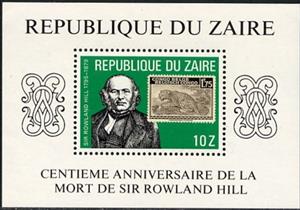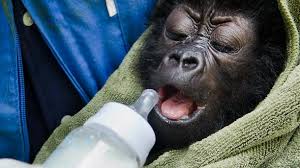Souvenir Sheet: Sir Rowland Hill (Zaire 1980)
Sir Rowland Hill (Zaire 1980)
28 January (Zaire ) within release Centenary of the death of Sir Rowland Hill goes into circulation Souvenir Sheet Sir Rowland Hill face value 10 Zairean makuta
| Souvenir Sheet Sir Rowland Hill in catalogues | |
|---|---|
| Michel: | Mi:CD BL32 |
| Belgium: | Bel:CD BL38 |
Souvenir Sheet is horizontal format.
Also in the issue Centenary of the death of Sir Rowland Hill:
- Stamp - Sir Rowland Hill face value 2;
- Stamp - Sir Rowland Hill face value 4;
- Stamp - Sir Rowland Hill face value 20;
- Stamp - Sir Rowland Hill face value 150;
- Stamp - Sir Rowland Hill face value 200;
- Stamp - Sir Rowland Hill face value 250;
- Stamp - Sir Rowland Hill face value 10;
- Souvenir Sheet - Sir Rowland Hill face value 10;
Souvenir Sheet Sir Rowland Hill it reflects the thematic directions:
Mammals are any vertebrates within the class Mammalia (/məˈmeɪli.ə/ from Latin mamma "breast"), a clade of endothermic amniotes distinguished from reptiles (including birds) by the possession of a neocortex (a region of the brain), hair, three middle ear bones and mammary glands. All female mammals nurse their young with milk, secreted from the mammary glands. Mammals include the largest animals on the planet, the great whales. The basic body type is a terrestrial quadruped, but some mammals are adapted for life at sea, in the air, in trees, underground or on two legs. The largest group of mammals, the placentals, have a placenta, which enables the feeding of the fetus during gestation. Mammals range in size from the 30–40 mm (1.2–1.6 in) bumblebee bat to the 30-meter (98 ft) blue whale. With the exception of the five species of monotreme (egg-laying mammals), all modern mammals give birth to live young. Most mammals, including the six most species-rich orders, belong to the placental group. The largest orders are the rodents, bats and Soricomorpha (shrews and allies). The next three biggest orders, depending on the biological classification scheme used, are the Primates (apes and monkeys), the Cetartiodactyla (whales and even-toed ungulates), and the Carnivora (cats, dogs, seals, and allies).
A postmaster is the head of an individual post office, responsible for all postal activities in a specific post office. When a postmaster is responsible for an entire mail distribution organization (usually sponsored by a national government), the title of Postmaster General is commonly used. Responsibilities of a postmaster typically include management of a centralized mail distribution facility, establishment of letter carrier routes, supervision of letter carriers and clerks, and enforcement of the organization's rules and procedures. The postmaster is the representative of the Postmaster General in that post office.
Animals are multicellular, eukaryotic organisms of the kingdom Animalia (also called Metazoa). All animals are motile, meaning they can move spontaneously and independently, at some point in their lives. Their body plan eventually becomes fixed as they develop, although some undergo a process of metamorphosis later on in their lives. All animals are heterotrophs: they must ingest other organisms or their products for sustenance.



